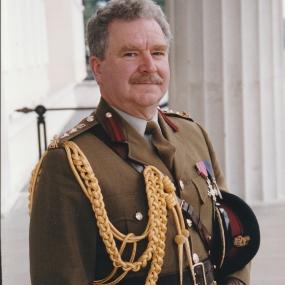Obituary: Colonel Roger Stanley Pelham Tamlyn MBE

25/11/1939 to 14/09/2018
Colonel Roger Stanley Pelham Tamlyn MBE was a Senior Consultant in Anaesthetics and Intensive Care in the Royal Army Medical Corps
Roger was born in Devizes in November 1939 to Ernest “Stanley” and Mona Olive Tamlyn, their only child. In wartime his father served in Britain with the Army Physical Training Corps and afterwards in Singapore, so Roger boarded for his secondary education at Dauntsey’s school, West Lavington. Family overseas visits were limited and many holidays were spent with godparents or fellow pupils. Roger was an enthusiastic Army cadet and skilled fencer, for 3 years South West Counties fencing champion. He often spoke of his schooldays and their role in his self-development.
In 1959 he became a medical student at King’s College and then Kings College Hospital. He is still fondly remembered by student friends for his old-fashioned courtesy and manners, enormous sense of fun and for his pride and joy, his 1962 Morgan Plus Four drophead. He also captained King’s Fencing team for some years. In 1963 he was commissioned into the RAMC.
After graduation in 1966 his pre-Registration House jobs were at Kings College Hospital and Salisbury. In the late 1960’s, as a junior Regimental doctor and qualified Army diver he supported Royal Engineer Regiments in the Caribbean, and later in Ethiopia.
In Ethiopia as a Captain in late 1969, while contributing to “hearts and minds,” he was providing leave cover for the surgeon at a local missionary hospital when there was a terrible local bus accident causing 17 seriously injured casualties and 4 fatalities. Roger operated alone almost continuously for 5 days using only rag and bottle anaesthesia which he also administered, in catastrophic and completely inadequate conditions. For this he was awarded a military MBE in 1970. The citation records that it was “little short of miraculous that none of his patients died”.
Modestly, he was more likely to relate his subsequent encounter with a large Nile crocodile which had been terrorising the locals. With a small team he tracked it down - and the crocodile launched itself into the air towards him, jaws wide and tail thrashing. He killed it with his first round. Luckily, he was a competent game shot, since the next round would not have fired – it was found afterwards to have jammed. The hugely relieved local community honoured him with a celebratory farewell "ululation". The Emperor Haile Selassie himself presented Roger with a gold medal in recognition of his services and later arranged for the crocodile skin to be sent to Britain, where it became a fixture on a bedroom floor.
Roger’s postgraduate training in anaesthetics ran in conjunction with Army postings throughout the 1970s to military hospitals at Tidworth, Hannover and Aldershot. A year was spent almost continuously on-call at the British Military hospital in Dharan, Nepal. He was intermittently SHO/Registrar at Musgrave Park Hospital and Royal Victoria Hospital Belfast, and also at military hospitals in Germany.
In 1973/4 he was a member of the 10-man crew of “British Soldier” on Leg 3 of the Round the World Yacht Race from Sydney to Rio de Janeiro; this included navigating around Cape Horn so he became officially a “Cape Horner”.
From 1976 to 1980 he was Honorary Anaesthetics Registrar at Liverpool University and then Westminster and Southampton Hospitals, passing the FFARCS exam in 1977. His research interests developed in fields including blast lung and the early use of ketamine in treating battle casualties. Later, he was to be instrumental in the development of portable ventilators for transporting casualties. He was appointed Consultant in 1980, serving initially at the Duchess of Kents’ Military Hospital Catterick, in those days the area’s main general hospital for major trauma. Subsequently he was Consultant BMH Hong Kong, at BMH Rinteln, Queen Elizabeth Military Hospital Woolwich, the Falkland Islands, the Ministry of Defence Hospital Unit at Frimley, and the Royal Naval Hospital Haslar.
“Colonel T” was an enthusiastic and respected teacher of his juniors and also of the many Army dentists he trained in basic field anaesthesia. Former senior colleagues describe him as an "outstanding clinician and utterly competent; he exuded calm and confidence and inspired all around him to excel themselves in even the most challenging surgical scenarios".
In 1996 Roger was proud to be appointed a Queen’s Honorary Surgeon. His very active service eventually took its toll on his back and he retired on medical grounds in late 1999.
His many friends speak of Roger as an extraordinary man of special character, and a style perhaps reminiscent of an earlier century: an “original” of great moral and physical courage with nerves of steel. He created laughter and fun around him and was a raconteur of seemingly unbelievable tales of adventure, all in fact true. A total perfectionist - "if it's worth doing, it's worth doing well" - he was widely self-educated, his encyclopaedic knowledge ranging from military history to Chinese ceramics, ballistics, trees and plants. A true polymath, he was also a prize-winning fly fisherman and a fine shot with rifle and shotgun. He and his succession of devoted black Labradors were long-standing members of several English military shoots whilst both he, and they, were still able.
He retired to the house he inherited in Bournemouth and spent many happy years re-designing his garden, its canopy of trees providing a micro-climate for his extensive collection of camellias and rhododendrons. Latterly he married his long-term partner Jennie, herself a military doctor.
Jennifer Tamlyn
Keith Galbraith
